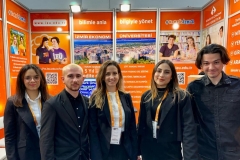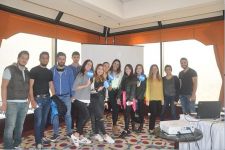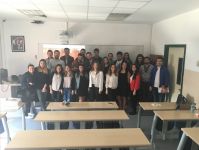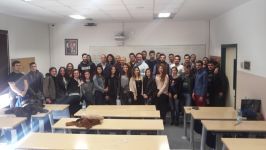
VOCATIONAL SCHOOL
Department of Tourism and Hotel Management (Turkish)
MTOI 260 | Course Introduction and Application Information
| Course Name |
Alternative Tourism
|
|
Code
|
Semester
|
Theory
(hour/week) |
Application/Lab
(hour/week) |
Local Credits
|
ECTS
|
|
MTOI 260
|
Fall/Spring
|
2
|
0
|
2
|
3
|
| Prerequisites |
None
|
|||||
| Course Language |
Turkish
|
|||||
| Course Type |
Elective
|
|||||
| Course Level |
Short Cycle
|
|||||
| Mode of Delivery | face to face | |||||
| Teaching Methods and Techniques of the Course | Guest SpeakerLecture / Presentation | |||||
| Course Coordinator | - | |||||
| Course Lecturer(s) | ||||||
| Assistant(s) | - | |||||
| Course Objectives | The aim of this course is to convey alternative tourism types and examples of these tourism types in the world and in Turkey. |
| Learning Outcomes |
The students who succeeded in this course;
|
| Course Description | Important factors in the development of alternative tourism, alternative tourism types, the importance and development of alternative tourism types, application examples of alternative tourism types in the world and Turkey will be explained in this course. |
|
|
Core Courses | |
| Major Area Courses |
X
|
|
| Supportive Courses | ||
| Media and Management Skills Courses | ||
| Transferable Skill Courses |
WEEKLY SUBJECTS AND RELATED PREPARATION STUDIES
| Week | Subjects | Related Preparation |
| 1 | Effective Factors in the Development of Tourism | Aslı Albayrak, “Alternatif Turizm”, Detay Yayıncılık, 2013. pp. 1-30 |
| 2 | Concept of Alternative Tourism, Development of Alternative Tourism in the World and in Turkey | Aslı Albayrak, “Alternatif Turizm”, Bölüm 1, Detay Yayıncılık, 2013. Chapter 3, pp. 31-49 |
| 3 | Health Tourism | Aslı Albayrak, “Alternatif Turizm”, Detay Yayıncılık, 2013. Chapter 4, pp. 105-132 |
| 4 | Culture Tourism | Aslı Albayrak, “Alternatif Turizm”, Detay Yayıncılık, 2013. Chapter 4, pp. 49-85 |
| 5 | Rural Tourism | Aslı Albayrak, “Alternatif Turizm”, Detay Yayıncılık, 2013. Chapter 4, pp. 132-176 |
| 6 | Recreational Tourism | Aslı Albayrak, “Alternatif Turizm”, Detay Yayıncılık, 2013. Chapter 4, pp. 176-186. |
| 7 | Midterm Exam | |
| 8 | Sports Tourism | Aslı Albayrak, “Alternatif Turizm”, Detay Yayıncılık, 2013. Chapter 4, pp. 186-230. |
| 9 | Gastronomy Tourism | Aslı Albayrak, “Alternatif Turizm”, Detay Yayıncılık, 2013. Chapter 4, pp. 244-264. |
| 10 | Technical Tour | Aslı Albayrak, “Alternatif Turizm”, Detay Yayıncılık, 2013. Chapter 4, pp. 220-224. |
| 11 | Youth and Third Age Tourism | Aslı Albayrak, “Alternatif Turizm”, Detay Yayıncılık, 2013. Chapter 4, pp. 264-273. |
| 12 | Technical Tour | |
| 13 | Alternative Tourism Practices | |
| 14 | Student Presentations | |
| 15 | Semester Review | Aslı Albayrak, “Alternatif Turizm”, Detay Yayıncılık, 2013. Chapter 1-4, pp. 1-273. |
| 16 | Final Exam |
| Course Notes/Textbooks | Aslı Albayrak, “Alternatif Turizm”, Detay Yayıncılık, 2013. ISBN: 9786055216313 |
| Suggested Readings/Materials |
EVALUATION SYSTEM
| Semester Activities | Number | Weigthing |
| Participation |
1
|
10
|
| Laboratory / Application | ||
| Field Work | ||
| Quizzes / Studio Critiques | ||
| Portfolio | ||
| Homework / Assignments | ||
| Presentation / Jury |
1
|
20
|
| Project | ||
| Seminar / Workshop | ||
| Oral Exams | ||
| Midterm |
1
|
30
|
| Final Exam |
1
|
40
|
| Total |
| Weighting of Semester Activities on the Final Grade |
3
|
60
|
| Weighting of End-of-Semester Activities on the Final Grade |
1
|
40
|
| Total |
ECTS / WORKLOAD TABLE
| Semester Activities | Number | Duration (Hours) | Workload |
|---|---|---|---|
| Theoretical Course Hours (Including exam week: 16 x total hours) |
16
|
3
|
48
|
| Laboratory / Application Hours (Including exam week: '.16.' x total hours) |
16
|
0
|
|
| Study Hours Out of Class |
14
|
1
|
14
|
| Field Work |
0
|
||
| Quizzes / Studio Critiques |
0
|
||
| Portfolio |
0
|
||
| Homework / Assignments |
0
|
||
| Presentation / Jury |
1
|
7
|
7
|
| Project |
0
|
||
| Seminar / Workshop |
0
|
||
| Oral Exam |
0
|
||
| Midterms |
1
|
9
|
9
|
| Final Exam |
1
|
12
|
12
|
| Total |
90
|
COURSE LEARNING OUTCOMES AND PROGRAM QUALIFICATIONS RELATIONSHIP
|
#
|
Program Competencies/Outcomes |
* Contribution Level
|
||||
|
1
|
2
|
3
|
4
|
5
|
||
| 1 | Has a basic knowledge of major theories, phenomena, concepts, and principles in the field of tourism. |
|||||
| 2 | Associate the professional knowledge acquired in the field with other disciplines and use it in the field of application. |
X | ||||
| 3 | Uses modern techniques and tools required to perform tourism services. |
|||||
| 4 | Uses computer software, automation systems and information technologies as required by the field of tourism and hotel management. |
|||||
| 5 | Improves himself / herself by following the developments in his / her field with the awareness of lifelong learning. |
X | ||||
| 6 | Has basic knowledge of legal regulations, professional standards, ethical principles, and professional awareness in the field. |
X | ||||
| 7 | Communicates effectively with guests and collaborators in written and verbal expressions. |
|||||
| 8 | Develops creative and innovative solutions individually and as a team to possible problems that may be encountered in tourism services. |
|||||
| 9 | Has knowledge on occupational safety, worker health, environmental protection and has quality awareness. |
|||||
| 10 | Demonstrates reading, understanding, speaking, and writing skills in English at least at the A2 level of the European Language Portfolio. |
|||||
| 11 | Follows the information about tourism and hotel management and communicates with colleagues using two foreign languages. |
|||||
*1 Lowest, 2 Low, 3 Average, 4 High, 5 Highest
NEWS |ALL NEWS
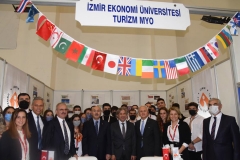
IUE Students at Travel Turkey
Izmir University of Economics (IUE) Vocational School, Tourism and Hotel Management Program opened a booth in Travel Turkey Izmir, one of the
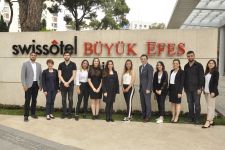
Tourism students of IUE working at Swissotel
Students of tourism and hospitality management program at Izmir University of Economics Vocational School have started to have impact on the sector.

